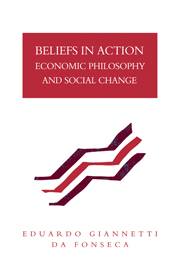Book contents
- Frontmatter
- Contents
- Preface and acknowledgements
- List of abbreviations
- PART I THE WAR OF IDEAS
- 1 From Hume to Hayek Economic philosophy and the role of ideas in social action
- 2 The scientific challenge to economic philosophy, I Physicalism and the birth of the ‘man–machine’ doctrine: La Mettrie
- 3 The scientific challenge to economic philosophy, II Economics and the rise of ‘economic man’: Jevons and Edgeworth
- 4 Economic man and man–machine Some logical parallels and contrasts between the two concepts
- 5 The logic of the economic situation Complex societies and the choice of conduct–enforcing mechanisms
- 6 The passions of the imagination, I Hume and Adam Smith on the sub–rational determinants of belief
- 7 The passions of the imagination, II Hume and Adam Smith on the psychology of the economic agent
- Conclusion to part I
- PART II PATTERNS OF MISUNDERSTANDING
- Conclusion to part II
- Notes
- Bibliography
- Index
Conclusion to part I
Published online by Cambridge University Press: 03 April 2010
- Frontmatter
- Contents
- Preface and acknowledgements
- List of abbreviations
- PART I THE WAR OF IDEAS
- 1 From Hume to Hayek Economic philosophy and the role of ideas in social action
- 2 The scientific challenge to economic philosophy, I Physicalism and the birth of the ‘man–machine’ doctrine: La Mettrie
- 3 The scientific challenge to economic philosophy, II Economics and the rise of ‘economic man’: Jevons and Edgeworth
- 4 Economic man and man–machine Some logical parallels and contrasts between the two concepts
- 5 The logic of the economic situation Complex societies and the choice of conduct–enforcing mechanisms
- 6 The passions of the imagination, I Hume and Adam Smith on the sub–rational determinants of belief
- 7 The passions of the imagination, II Hume and Adam Smith on the psychology of the economic agent
- Conclusion to part I
- PART II PATTERNS OF MISUNDERSTANDING
- Conclusion to part II
- Notes
- Bibliography
- Index
Summary
So, the message of the eighteenth–century ‘enlightened skeptics’ is clear: ‘nothing tends more to disturb our understanding, and precipitate us into any opinions, however unreasonable, than their connection with passion’ (THN,321). Or, as the poet finely put it: ‘Are passions, then, the pagans of the soul? Reason alone baptized?’
The study of man, according to this view, yields the conclusion that, although human nature is essentially uniform ‘in all nations and ages’ and stable ‘in its principles and operations’ (IstE,83), man's beliefs and opinions tend to be rather more volatile. As Hume observed: ‘Man is a very variable being, and susceptible of many different opinions, principles, and rules of conduct. What may be true, while he adheres to one way of thinking, will be found false, when he has embraced an opposite set of manners and opinions’ (E,255–6).
The whole argument (chapters 6 and 7) is aptly summarized by Mai thus' assertion that ‘The voluntary actions of men may originate in their opinions: but these opinions will be very differently modified in creatures compounded of a rational faculty and corporeal propensities, from what they would be in beings wholly intellectual’. The individual economic agent is best seen as a ‘compound being’: ‘A truth may be brought home to his conviction as a rational being, though he may determine to act contrary to it, as a compound being’.
- Type
- Chapter
- Information
- Beliefs in ActionEconomic Philosophy and Social Change, pp. 115 - 116Publisher: Cambridge University PressPrint publication year: 1991



